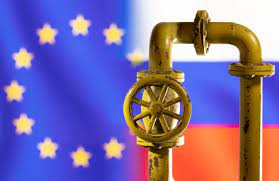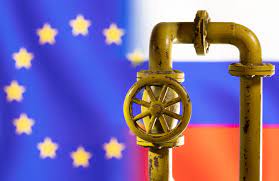
After weeks of negotiations on the emergency measure that has divided opinion within the bloc as it seeks to contain the energy crisis, the energy ministers of the European Union finally agreed on a gas price cap on Monday.
The cap is the EU's 27-country bloc's most recent effort to reduce gas prices, which have increased energy costs and led to record-high inflation this year after Russia stopped delivering the majority of its gas to Europe.
The Dutch Title Transfer Facility (TTF) gas hub's front-month contract, which serves as the European benchmark, has a price cap of 180 euros ($191.11) per megawatt hour. Ministers agreed that this price cap will be triggered if it crosses that threshold for three days.
Additionally, for a period of three days, the TTF price must be 35 euros per MWh higher than a reference price based on current LNG price assessments.
"We have succeeded in finding an important agreement that will shield citizens from skyrocketing energy prices," said Jozef Sikela, industry minister for the Czech Republic, which holds the rotating EU presidency.
The cap may be activated beginning on February 15, 2023. The agreement will need to receive formal, written approval from all parties before it can go into effect.
When activated, trades on the front-month, three-month, and front-year TTF contracts would not be allowed at a price greater than 35 euros/MWh above the reference LNG price.
This effectively sets a ceiling on the price at which gas can be traded while allowing the ceiling level to change in line with market LNG prices. This system was created to ensure that EU countries can continue to bid at competitive prices for gas imported from international markets.
According to three EU officials, Germany cast a vote in favor of the agreement despite having expressed concerns about the policy's effects on Europe's ability to secure gas supplies in price-competitive international markets.
A Reuters official from the EU Germany agreed to the price cap after other nations accepted changes to a different regulation on expediting renewable energy permits, and the cap was strengthened with stronger safeguards.
These protections include the suspension of the cap in the event of a gas supply shortage in the EU, a decline in TTF trading, an increase in gas consumption, or a material rise in margin calls from gas market participants.
Europe's energy companies have been rocked by the rising cost of gas and electricity, forcing utilities and traders to obtain additional funding from banks and governments to meet margin call requirements.
Germany's Uniper, which hurried to fill the gap left by Russia cutting supplies, has incurred derivative losses totaling billions of euros, worsening the crisis.
The TTF front-month contract has only 64 times in its history closed above 180 euros/MWh, according to Jacob Mandel, senior associate at Aurora Energy Research. These all occurred in 2022.
Only Hungary, according to two EU officials, voted against the price cap.
Netherlands and Austria didn't participate. Both had resisted the cap during the negotiations out of concern that it might disturb the energy markets in Europe and jeopardize its energy security.
The market correction mechanism is still potentially dangerous, according to Rob Jetten, the minister of energy for the Netherlands, despite recent improvements.
"I remain worried about major disruptions on the European energy market, about the financial implications and, most of all, I am worried about European security of supply," he added.
Some market participants have also voiced opposition to the EU proposal, claiming it could lead to financial instability.
The Intercontinental Exchange (ICE), which hosts TTF trading on its Amsterdam exchange, said last week that if the EU set price caps, it might move TTF trading outside of the EU.
It stated on Monday that it would evaluate its ability to maintain fair and efficient markets for TTF gas hub trading. ICE TTF markets will trade normally for the time being.
According to Refinitiv Eikon data, the front month TTF gas price ended Monday's trading session 9% lower at 107 euros/MWh.
In August, the contract's price spiked to a record high of 343 euros, which prompted the EU to proceed with its price cap.
According to Stefano Besseghini, the president of Italy's energy regulator ARERA, gas prices will continue to rise as winter approaches.
According to the Russian Interfax news agency, Dmitry Peskov, the Kremlin's spokesman, called the cap an attack on market pricing and unacceptable.
The agreement comes after months of discussion on the subject and two prior emergency meetings that failed to reach a consensus among EU nations on whether a price cap would aid or obstruct Europe's efforts to contain the energy crisis.
Around 15 nations, including Belgium, Greece, and Poland, had demanded a cap below 200 euros/MWh, which is significantly less than the 275 euros/MWh trigger limit that the European Commission had initially suggested last month.
The price cap, according to the prime minister of Poland, will prevent Russia and Gazprom from distorting the market.
"At the recent meetings in Brussels, our majority coalition managed to break the resistance - mainly from Germany," Mateusz Morawiecki wrote on Twitter. "This means the end of market manipulation by Russia and its company Gazprom."
(Source:www.reuters.com)
The cap is the EU's 27-country bloc's most recent effort to reduce gas prices, which have increased energy costs and led to record-high inflation this year after Russia stopped delivering the majority of its gas to Europe.
The Dutch Title Transfer Facility (TTF) gas hub's front-month contract, which serves as the European benchmark, has a price cap of 180 euros ($191.11) per megawatt hour. Ministers agreed that this price cap will be triggered if it crosses that threshold for three days.
Additionally, for a period of three days, the TTF price must be 35 euros per MWh higher than a reference price based on current LNG price assessments.
"We have succeeded in finding an important agreement that will shield citizens from skyrocketing energy prices," said Jozef Sikela, industry minister for the Czech Republic, which holds the rotating EU presidency.
The cap may be activated beginning on February 15, 2023. The agreement will need to receive formal, written approval from all parties before it can go into effect.
When activated, trades on the front-month, three-month, and front-year TTF contracts would not be allowed at a price greater than 35 euros/MWh above the reference LNG price.
This effectively sets a ceiling on the price at which gas can be traded while allowing the ceiling level to change in line with market LNG prices. This system was created to ensure that EU countries can continue to bid at competitive prices for gas imported from international markets.
According to three EU officials, Germany cast a vote in favor of the agreement despite having expressed concerns about the policy's effects on Europe's ability to secure gas supplies in price-competitive international markets.
A Reuters official from the EU Germany agreed to the price cap after other nations accepted changes to a different regulation on expediting renewable energy permits, and the cap was strengthened with stronger safeguards.
These protections include the suspension of the cap in the event of a gas supply shortage in the EU, a decline in TTF trading, an increase in gas consumption, or a material rise in margin calls from gas market participants.
Europe's energy companies have been rocked by the rising cost of gas and electricity, forcing utilities and traders to obtain additional funding from banks and governments to meet margin call requirements.
Germany's Uniper, which hurried to fill the gap left by Russia cutting supplies, has incurred derivative losses totaling billions of euros, worsening the crisis.
The TTF front-month contract has only 64 times in its history closed above 180 euros/MWh, according to Jacob Mandel, senior associate at Aurora Energy Research. These all occurred in 2022.
Only Hungary, according to two EU officials, voted against the price cap.
Netherlands and Austria didn't participate. Both had resisted the cap during the negotiations out of concern that it might disturb the energy markets in Europe and jeopardize its energy security.
The market correction mechanism is still potentially dangerous, according to Rob Jetten, the minister of energy for the Netherlands, despite recent improvements.
"I remain worried about major disruptions on the European energy market, about the financial implications and, most of all, I am worried about European security of supply," he added.
Some market participants have also voiced opposition to the EU proposal, claiming it could lead to financial instability.
The Intercontinental Exchange (ICE), which hosts TTF trading on its Amsterdam exchange, said last week that if the EU set price caps, it might move TTF trading outside of the EU.
It stated on Monday that it would evaluate its ability to maintain fair and efficient markets for TTF gas hub trading. ICE TTF markets will trade normally for the time being.
According to Refinitiv Eikon data, the front month TTF gas price ended Monday's trading session 9% lower at 107 euros/MWh.
In August, the contract's price spiked to a record high of 343 euros, which prompted the EU to proceed with its price cap.
According to Stefano Besseghini, the president of Italy's energy regulator ARERA, gas prices will continue to rise as winter approaches.
According to the Russian Interfax news agency, Dmitry Peskov, the Kremlin's spokesman, called the cap an attack on market pricing and unacceptable.
The agreement comes after months of discussion on the subject and two prior emergency meetings that failed to reach a consensus among EU nations on whether a price cap would aid or obstruct Europe's efforts to contain the energy crisis.
Around 15 nations, including Belgium, Greece, and Poland, had demanded a cap below 200 euros/MWh, which is significantly less than the 275 euros/MWh trigger limit that the European Commission had initially suggested last month.
The price cap, according to the prime minister of Poland, will prevent Russia and Gazprom from distorting the market.
"At the recent meetings in Brussels, our majority coalition managed to break the resistance - mainly from Germany," Mateusz Morawiecki wrote on Twitter. "This means the end of market manipulation by Russia and its company Gazprom."
(Source:www.reuters.com)














